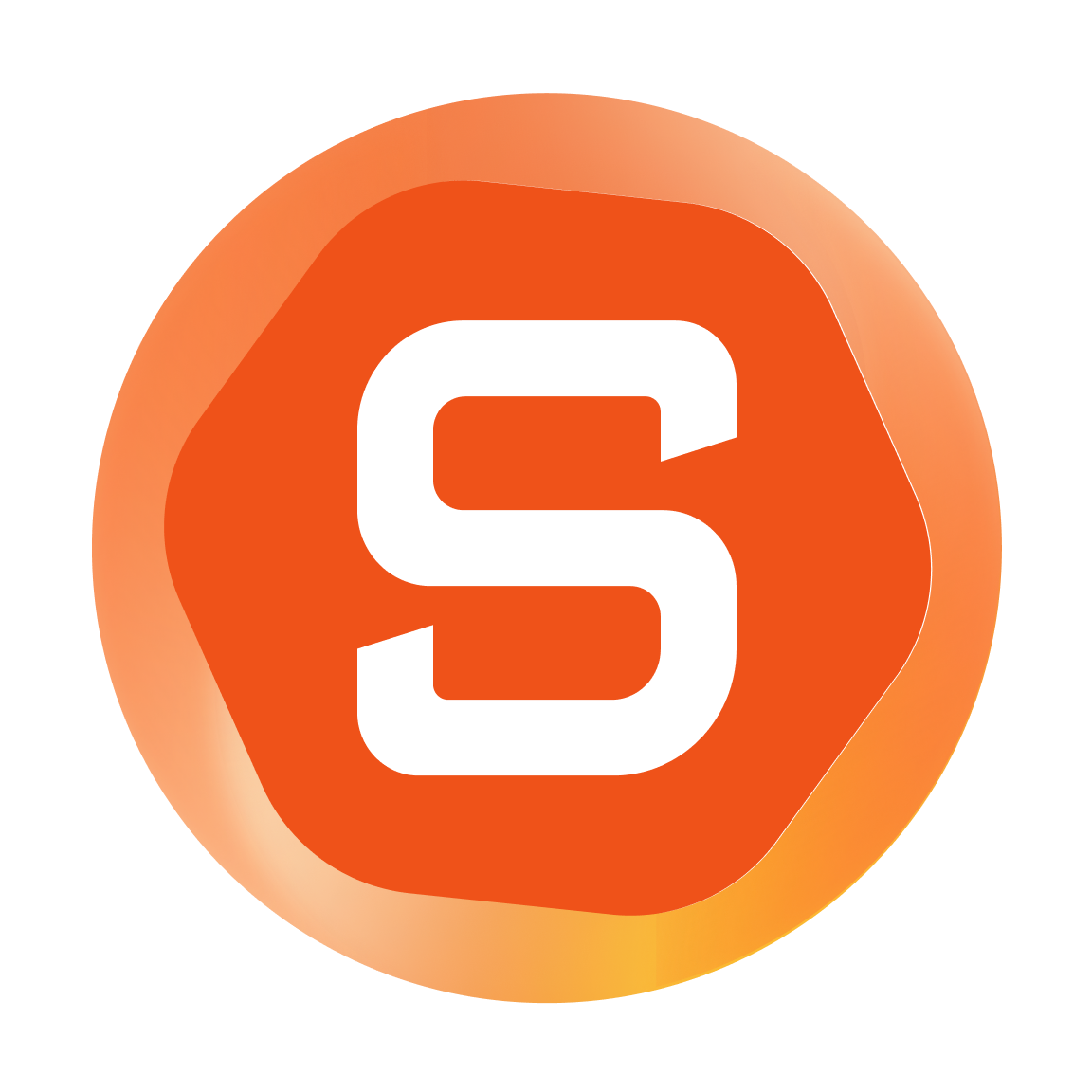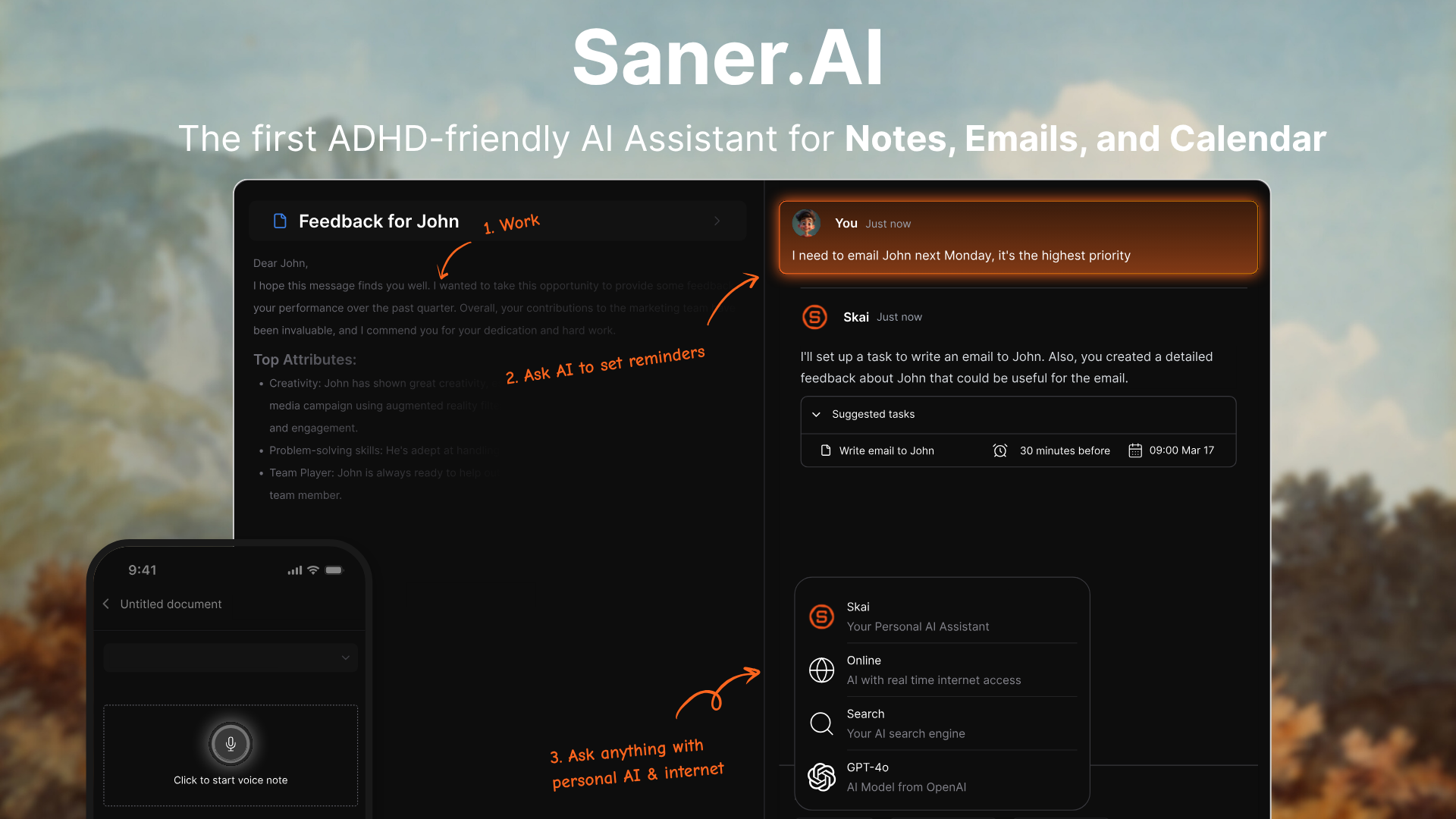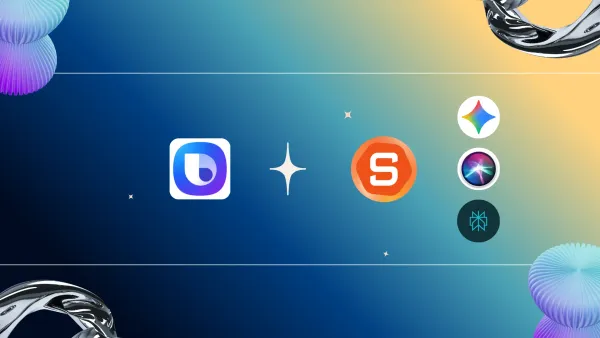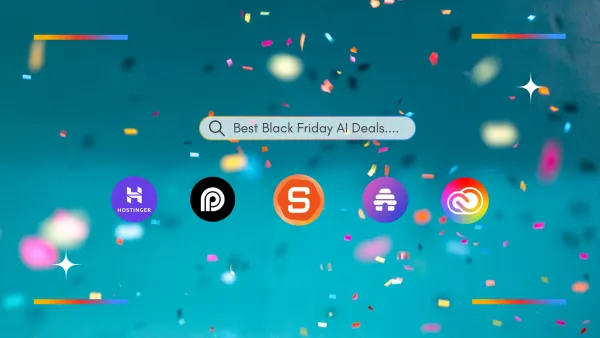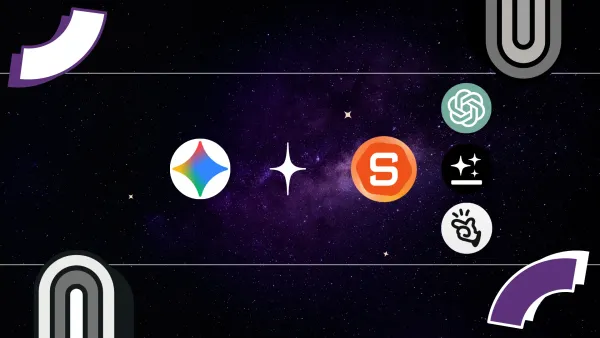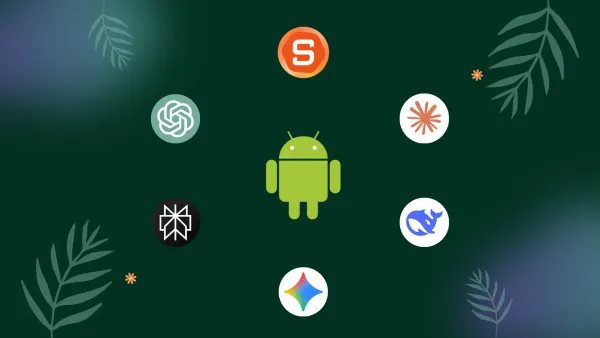Neurodivergent Apps for Adults: We Tested the Best 7 Tools
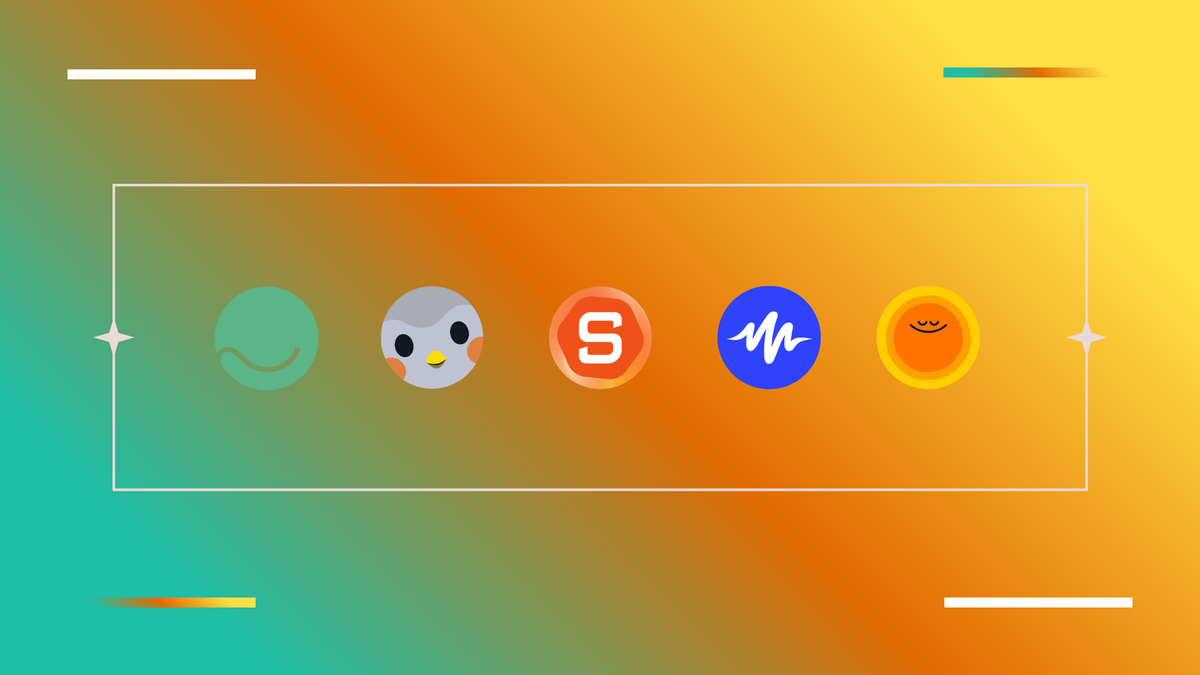
The Best 7 Neurodivergent Apps for Adults to Improve Productivity
Overwhelmed, Forgetful, or Stuck? You’re Not Alone.
If you’re neurodivergent - ADHD, autistic, dyslexic, or otherwise wired a little differently - you’ve likely had moments where everything feels too much.
Deadlines slip. Tasks pile up. Your brain bounces between tabs while forgetting what you were trying to do in the first place.
That’s not laziness. That’s executive dysfunction. And it’s something apps can help with - when they’re actually designed for brains like ours.
In this guide, we’re diving into the best neurodivergent apps in 2025 -tools that reduce overwhelm, simplify planning, and support emotional regulation without adding more friction.
Whether you need an ADHD-friendly planner, an app to help with memory, or a tool to turn chaos into calm, this list is for you.
What Makes a Great Neurodivergent App?
Not every productivity app works for neurodivergent users. In fact, many do the opposite - creating more stress.
Here’s what separates the truly supportive apps from the rest:
✅ Low-friction UX – Minimal clicks. Intuitive layout. No overwhelm.
✅ Visual & audio support – Icons, color-coding, timers, voice input/output.
✅ Customizable reminders – Gentle nudges, not anxiety triggers.
✅ Sensory-friendly design – Calm visuals, dark mode, no noisy notifications.
✅ Supports memory + follow-through – Helps with sequencing, task breakdown, and recall.
✅ Emotional regulation tools – Breathwork, mood tracking, grounding exercises.
✅ Affordable or free – Because accessibility shouldn’t come with a price tag.
How We Chose These Apps
We picked apps based on a mix of:
- ✳️ Neurodivergent-first or neurodivergent-loved design
- 👥 Real-world community adoption and reviews
- 📚 Evidence-based practices (backed by research when possible)
- 💰 Affordability
- 🌟 Unique value — either it solves a problem well or fills a gap
What are the Best Neurodivergent Apps for Adults?
The best Neurodivergent Apps for Adults are Saner.AI, Finch, Tiimo, Goblin, and Headspace
🧩 Comparison Table: Best Neurodivergent Apps
| App | Best For | Platforms | Pricing | Neurodivergent Support Strength |
|---|---|---|---|---|
| Saner.AI | All-in-one workspace for ADHD brains | Web, macOS, iOS (beta) | Free plan, Paid from $8/mo | ⭐⭐⭐⭐⭐ — Designed by ADHDers; reduces context switching |
| Tiimo | Visual daily planning for ADHD & autism | iOS, Android | Free plan, Premium $3–5/mo | ⭐⭐⭐⭐⭐ — Neurodivergent-first design |
| Goblin.tools | Executive dysfunction, breaking down tasks | Web, iOS (beta) | Free (donations welcome) | ⭐⭐⭐⭐ — Task breakdown, low-friction UX |
| Headspace | Emotional regulation and mindfulness | iOS, Android, Web | Free plan, Premium $12.99/mo | ⭐⭐⭐⭐ — ADHD & anxiety collections, gentle audio |
| Finch | Mood tracking and self-care habit building | iOS, Android | Free with in-app purchases | ⭐⭐⭐⭐ — Gamified, gentle nudges, emotional check-ins |
| Forest | Focus and time management via gamification | iOS, Android | $1.99 one-time purchase | ⭐⭐⭐ — Simple, motivating timer for deep work |
| Speechify | Reading support, text-to-speech for dyslexia | iOS, Android, Web | Free tier, Premium $139/year | ⭐⭐⭐⭐ — Audio-first, ideal for neurodivergent learners |
1) Saner.AI
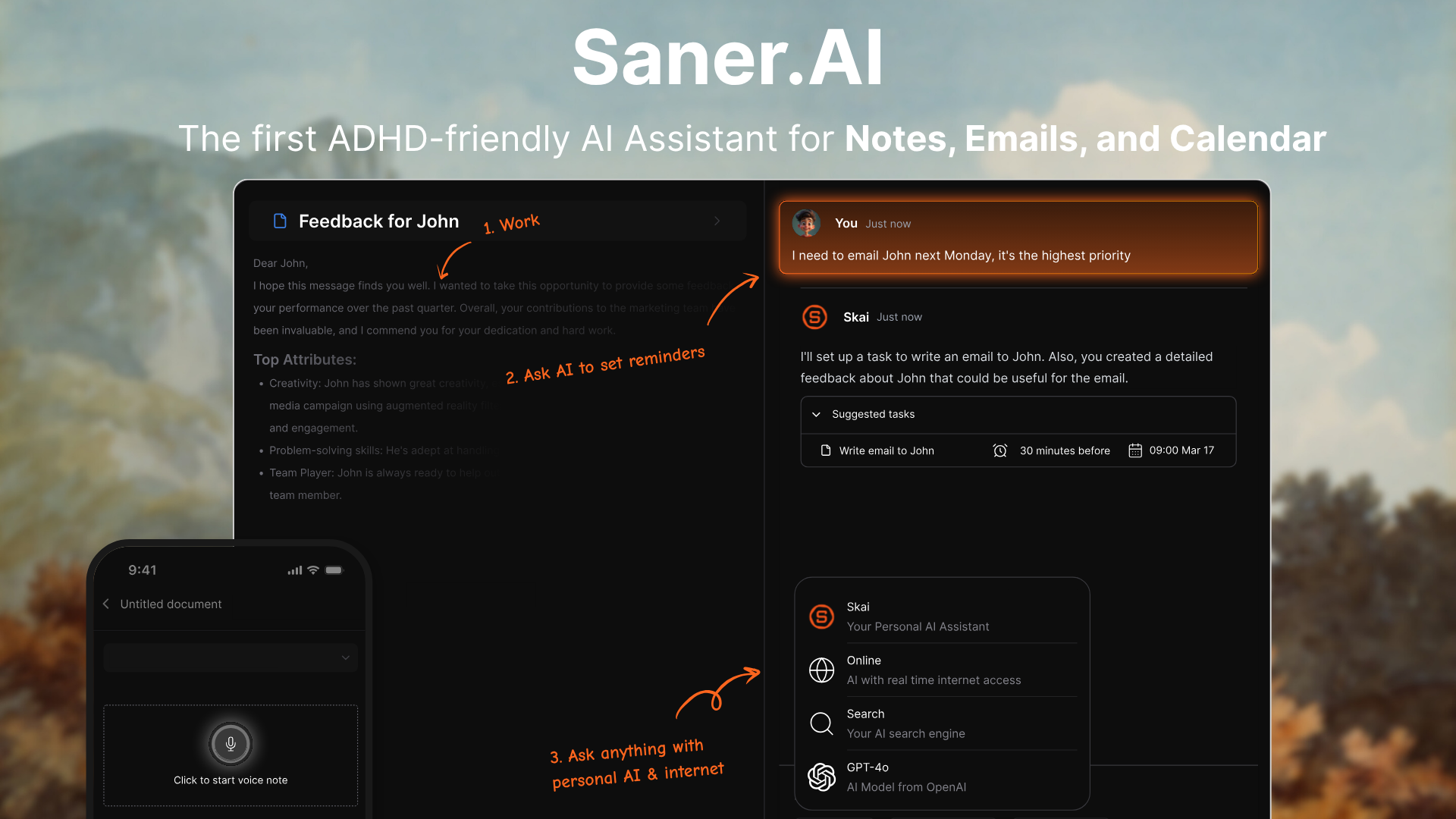
Saner.AI is a neurodivergent-friendly AI assistant that helps you stay focused and organized by putting your notes, tasks, calendar, and email in one calming workspace. Instead of switching between 5 apps, you can just talk to your AI assistant to plan your day, remember what matters, and get things done.
Key features
- Unified Workspace: Combines notes, tasks, calendar, email, and documents in one searchable hub
- Skai Assistant: Lets you talk to your notes and ask questions to find anything you've saved or forgotten
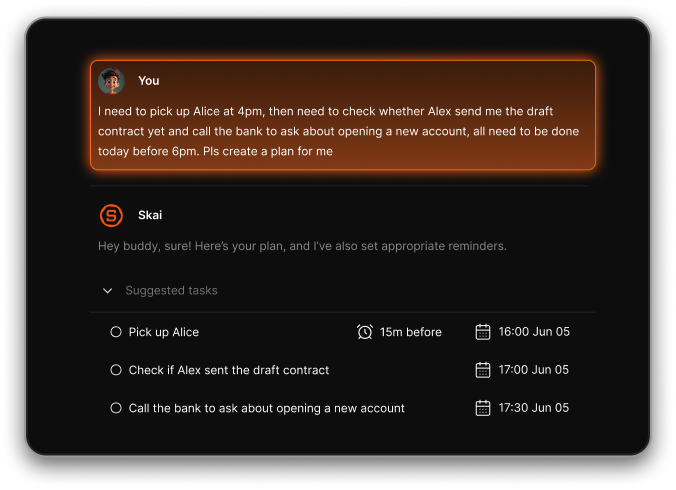
- AI planner: Automatically scans your information and gives you a day plan every morning. It then checks in on you throughout the day to make sure everything is on track
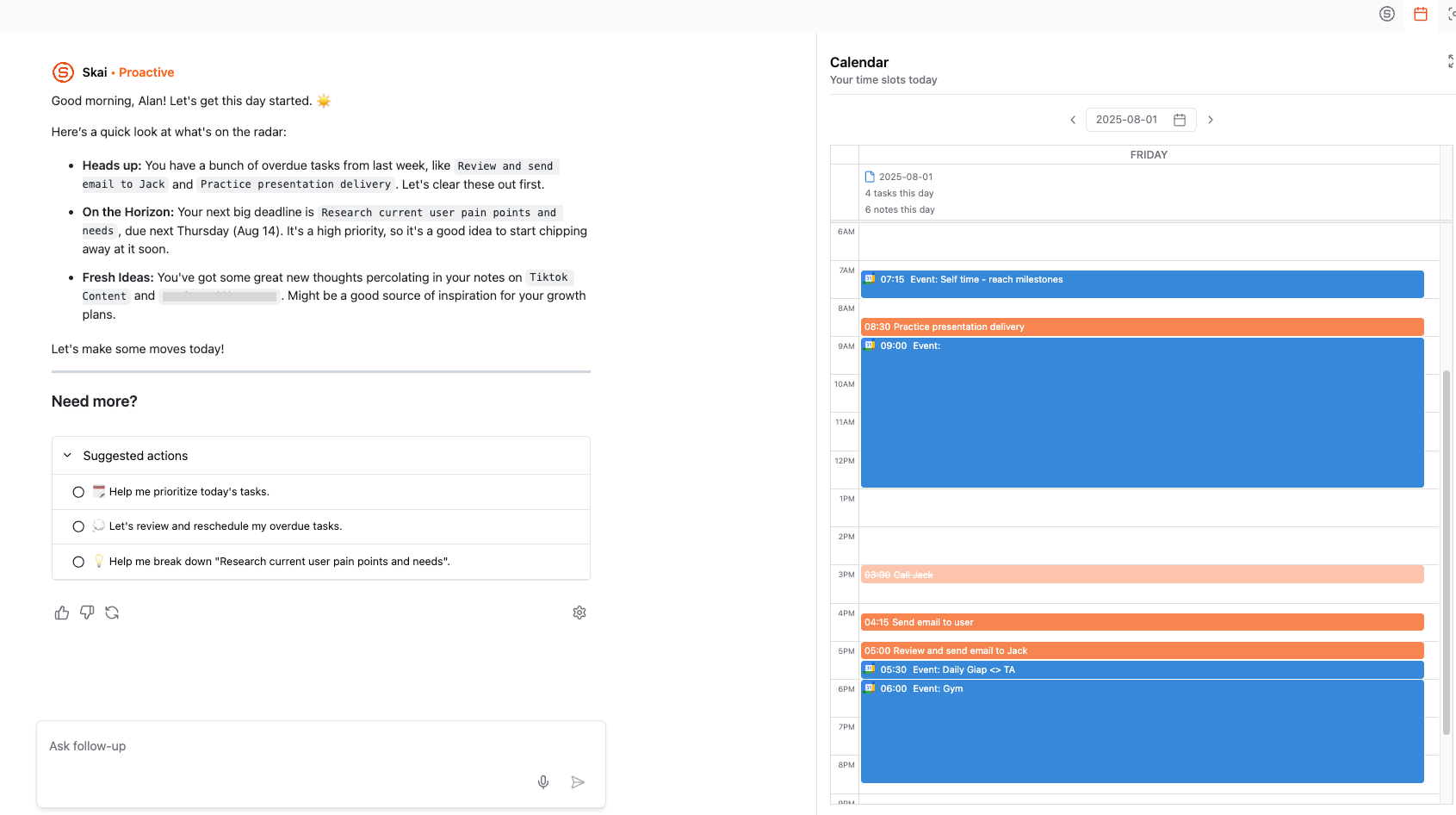
- Smart Task Assistant: Pulls to-dos from your emails and notes, helps you break tasks down, and set reminders
- Minimalist Design: Clean, distraction-friendly interface that avoids visual clutter and folder fatigue
What I liked
- You don’t need to juggle tabs or tools - everything’s in one place, which helps with mental clarity
- Skai feels like a memory extension; it can recall past notes and surface things you forgot you saved
- Breaking down tasks into smaller steps is really helpful for ADHD-style planning
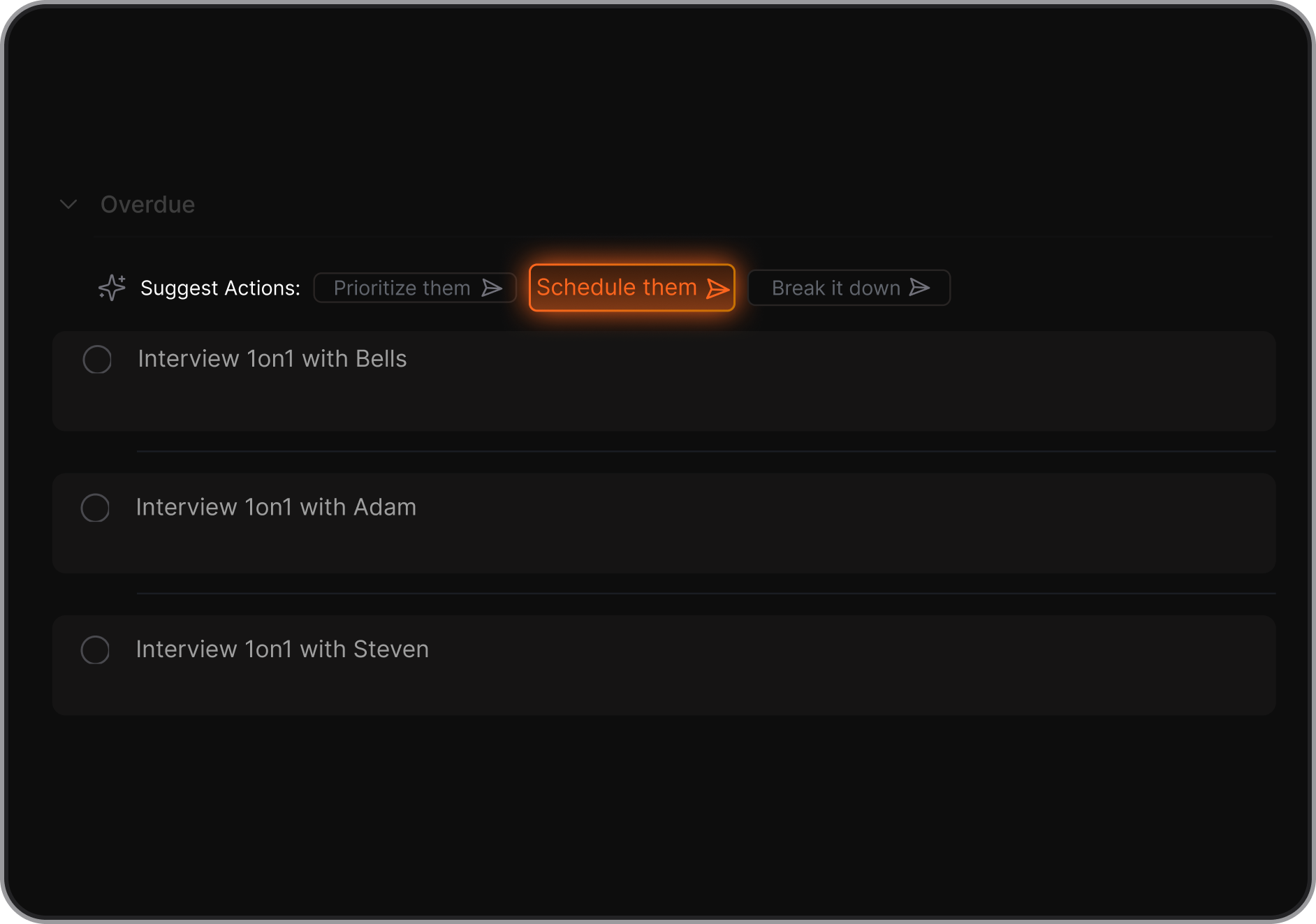
Cons:
- Requires internet access for full functionality
Pricing
- Free
- Starter: Monthly at $8/month, Annually at $6/month (with early user discount)
- Standard: Monthly at $16/month, Annually at $12/month (with early user discount)
Ideal for:
- ADHDers and neurodivergent individuals who want fewer tools and more clarity
- Professionals who feel overwhelmed by their current task + note + email setup
- People who prefer minimal UI and talking to their tools instead of clicking through apps
- Solo users or freelancers who want a personal assistant for day-to-day focus and memory
Saner.AI review

How to start using it?
- Head to saner.ai and create a free account
- Import your notes, connect email, and start adding tasks or thoughts
- Try talking to Skai to organize everything for you.
Get organized effortlessly with AI
2) Tiimo
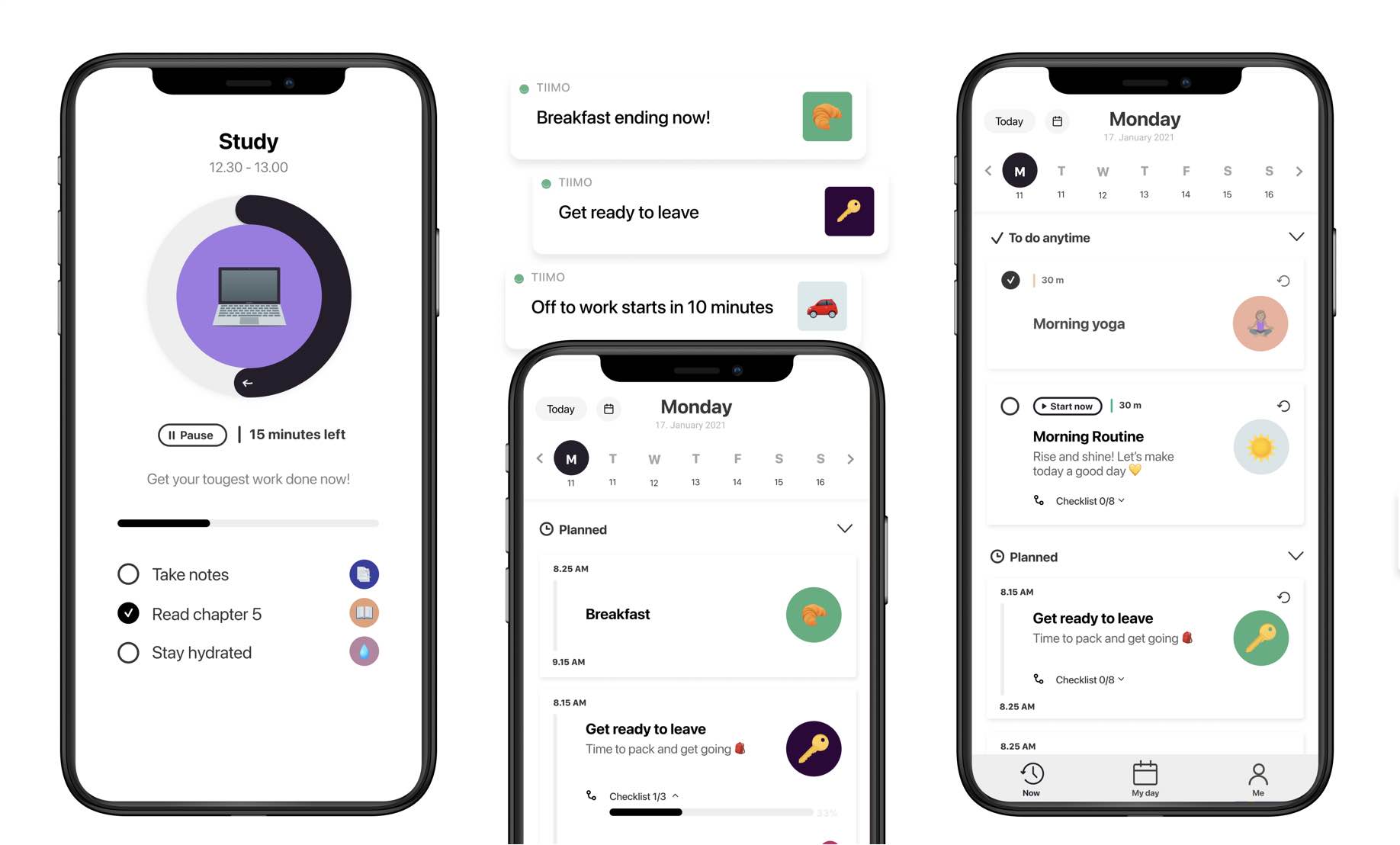
Tiimo is a visual planner designed specifically for neurodivergent users, especially those with ADHD or autism. It helps structure your day with visual routines, timers, and task breakdowns
Key features
- Visual Planner: color-coded activities with icons and timelines so you can “see” your day at a glance
- Flexible To-Do Lists: create tasks with subtasks, recurring patterns, and personalized reminders
- Focus Timer: helps manage task duration and transitions with visual timers and countdowns
- Mood Tracking: Log how you're feeling and spot patterns
What I liked
- Widgets and live reminders reduce the need to open the app every time you need to check something
- The focus timer makes it easier to manage transitions, which is often a challenge with ADHD
What I disliked
- Setting up routines and customizing reminders takes time
- Some users report performance issues on mobile, like lag or crashes when switching screens
- Not great for long-term planning or project management - it’s more about daily routines than complex workflows
- And you have to manually organize stuff yourself; you don't have an AI assistant to help you with it
Pricing
- Free version available with basic features
- Tiimo Pro unlocks full features with a 7-day free trial
Suitable for
- Users who want routine-building, task breakdowns, and gentle structure without rigid systems
- Great for kids, teens, or adults who want portable routine support across phone, tablet, and wearables
How to start
- Download Tiimo from the App Store or Google Play
- Set up a basic daily routine or to-do list to test the visual layout
Tiimo Reviews (source)

3) Finch
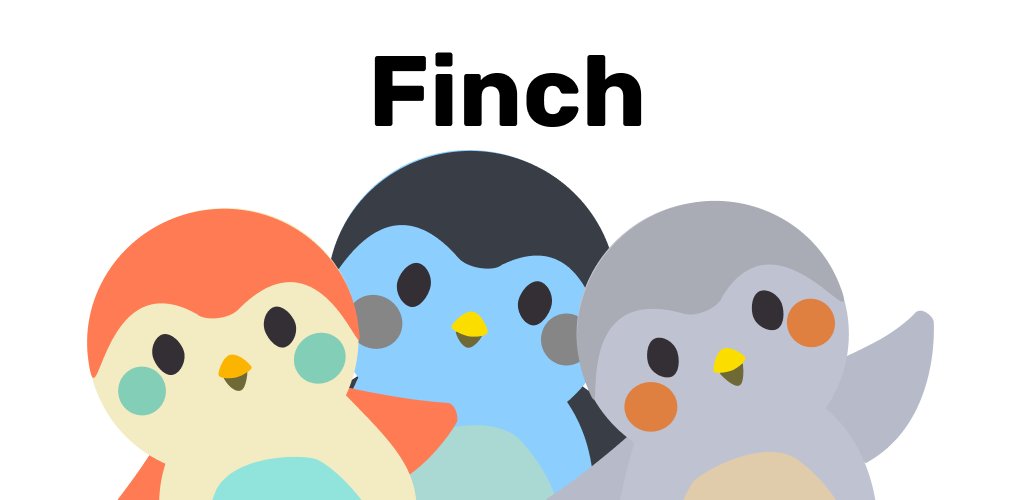
Finch is a gentle self-care app that helps you build habits, reflect on your emotions, and track your wellbeing by caring for a virtual pet. Every time you complete a task or journal, your Finch grows - turning daily self-care into something positive and rewarding.
Key features
- Goal and Journey System: build custom or pre-set self-care goals, broken into small daily tasks
- Mood Tracking and Check-ins: track emotions, energy levels, and reflect through daily prompts
- Journaling: includes freeform and guided prompts with keyword insights to help spot emotional patterns
- Gamification: your Finch grows, unlocks clothes and accessories as you complete tasks
What I liked
- The app feels emotionally supportive - no harsh reminders or guilt for missing a day
- Caring for your Finch adds a fun layer of motivation that actually helps build consistency

What I didn’t like
- The interface can feel a bit cluttered at first - there’s a lot going on with journeys, tools, check-ins, and rewards
- Goals sometimes feel rigid, and missing one can feel like a setback on low-energy days
- It may not be suitable for a working professional environment
- And you have to manually organize stuff yourself; you don't have an assistant to help you with it, like in Saner.AI
Pricing
- Free version available with core features
- Premium: Around $15/year on iOS, but up to $70/year on Android (yikes)
Suitable for
- Neurodivergent users with ADHD, anxiety, or executive dysfunction who need a positive way to build habits
- People who want gentle encouragement to care for themselves without harsh productivity expectations
How to start
- Download Finch from your device’s app store
- Create and name your Finch, then select your first self-care journey or goal
- Try a mood check-in and a journal entry to explore the emotional reflection tools
Finch reviews (source)

4) Goblin.tools

Goblin.Tools is a free, web-based suite of simple, AI-powered micro-tools built specifically for neurodivergent brains. Each tool is designed to support a specific executive function challenge
Key features
- Magic ToDo: breaks down overwhelming tasks into small, clear steps with adjustable detail levels
- Compiler: turns messy thoughts into clean, organized lists or action plans
- Estimator: helps you guess how long a task might take based on your energy and focus
- Formalizer: rewrites messages in different tones (professional, friendly, concise, polite, etc.)
What I liked
- You can just open the tool you need without navigating a cluttered interface—perfect when your brain is overloaded
- Magic ToDo and Compiler work great together for getting unstuck and turning thoughts into action
What I disliked
- Each tool is separate, so you have to switch between them manually
- You can’t save data across devices unless you use the paid mobile app
- There’s no calendar, reminders, or task tracking over time- it’s not a planning tool, just a support system
- Some AI suggestions can be hit-or-miss and need human tweaks
Pricing
- Web version is 100% free with no ads, accounts, or paywalls
- Mobile app is a one-time purchase (about $1.99–$4.99 depending on platform)
- No subscriptions or hidden upgrades—one payment unlocks the full app
Suitable for
- Neurodivergent users who struggle with task initiation, executive dysfunction, or communication anxiety
- Students, freelancers, or caregivers looking for accessible task and communication support
How to start
- Visit goblin.tools in your browser to use all tools instantly for free
- Try Magic ToDo for breaking down something you’ve been avoiding
5) Forest

Forest is a gamified focus timer that helps you stay off your phone by growing a virtual tree during your focus session. If you leave the app to scroll or check messages, the tree withers. It’s a simple but powerful way to make focus feel rewarding
Key features
- Focus Timer: plant a tree and let it grow while you focus; leave the app and it dies
- Stopwatch Mode: track open-ended focus sessions without setting a fixed duration
- Gamified Forest: earn coins for completed focus sessions and grow a personal forest
- Deep Focus Mode: blocks other apps and punishes phone usage during focus sessions
What I liked
- The visual tree-growing mechanic is surprisingly motivating, especially on days when it’s hard to get started
- The threat of “killing” your tree helps resist the urge to mindlessly scroll or check notifications
- It supports time-blindness by showing a visible, growing progress marker instead of just counting minutes
What I disliked
- If you accidentally open a blocked app, your tree dies, which can feel discouraging on low-energy days
- The free version on Android is limited, and some key features (tags, syncing, friend focus) require a paid upgrade
- You need to build the habit of actually starting the timer—there’s no automation or proactive reminders
Pricing
- Free on Android (with optional in-app purchases)
- ~$4 one-time purchase on iOS
- No monthly fees or subscriptions
Suitable for
- ADHDers and neurodivergent users who struggle with phone addiction, impulsivity, or starting tasks
- Students, freelancers, or remote workers who need structure without using a full task manager
- People who want a fun, light-touch focus tool with visual progress instead of long to-do lists
How to start
- Download Forest from your app store (iOS or Android)
- Set your first focus session timer - start with something short like 15 or 25 minutes
Forest Reviews (source)

6) Speechify

Speechify is a text-to-speech app that reads out documents, web pages, and PDFs in natural-sounding voices. It's designed to help you listen instead of read, whether you're multitasking, experiencing reading fatigue, or need auditory support for focus and comprehension.
It’s ideal for neurodivergent users with ADHD, dyslexia, or visual processing difficulties who benefit from auditory learning and reduced screen strain.
Key features
- Text-to-Speech Reader: converts digital text (documents, web pages, emails) into audio
- OCR Image Reader: lets you scan printed pages or screenshots and have them read aloud
- Voice and Language Options: dozens of languages, regional accents, and natural AI-generated voices
- Speed Control: adjust playback speed from slow to up to 5× faster with Premium
What I liked
- It cuts down reading fatigue and is especially helpful with dense, boring, or overwhelming documents
- Listening at faster speeds helps me absorb content during walks, chores, or long commutes
What I disliked
- The free plan is limited in voices, speed, and OCR - most useful features are locked behind Premium
- OCR sometimes struggles with complex page layouts, handwritten notes, or tables
- Some voices sound robotic or overly dramatic at higher speeds
Pricing
- Free plan includes basic text-to-speech, standard voices, and normal speed
- Premium plan costs around $139/year or $29/month
- Premium unlocks high-speed playback, OCR scanning, offline support, more voice and language options
Suitable for
- ADHDers, dyslexic users, or those with visual impairments who prefer auditory learning
- Students or researchers needing to absorb long readings or textbooks
How to start
- Download Speechify from the App Store, Google Play, or install the Chrome extension
- Try the free plan to test voice quality, speed control, and supported formats
Speechify review (source)

7) Headspace

Headspace is a calming mental wellness app focused on meditation, sleep support, and emotional regulation. It combines expert-guided content with simple tools like breathing, reflection, and even therapy
It’s ideal for neurodivergent users who benefit from structured, low-pressure routines and need support with overstimulation, anxiety, or winding down.
Key features
- Guided meditations for stress, anxiety, focus, and emotional regulation
- Sleep support with bedtime meditations, relaxing soundscapes, and narrated “sleepcasts”
- Mood tracking and personalized recommendations to surface the right sessions
- Headspace Care for access to therapy or coaching (available in select regions)
What I liked
- Very beginner-friendly
- The sleep tools are excellent for people who struggle to turn off their thoughts at night
- The design and flow of the app are gentle and distraction-free
What I disliked
- Subscription is pricey compared to other mental health apps, especially if you just use a few features
- There’s so much content that it can feel overwhelming
- Some sessions feel too long if you’re looking for short, practical tools in moments of distress
Pricing
- Free version includes a small selection of meditations and sleep tools
- Full access costs $12.99/month or around $69.99/year
- 14-day free trial often included with annual plan
Suitable for
- ADHDers and neurodivergent users who need help winding down, reducing overwhelm, or calming their nervous system
- People who benefit from audio guidance rather than text or rigid checklists
- Users looking for sleep help, emotional regulation, or daily grounding routines
How to start
- Download Headspace on iOS or Android or use the web version
- Try the free meditations or a sleepcast before bed to test what works for you
Headspace reviews (source)

💬 Final Thoughts: Your Brain Deserves Better Tools
If you’re neurodivergent, you’ve probably spent years trying to force your brain to fit systems that just weren’t built for you.
The truth is, you’re not broken - the tools were.
What’s exciting now is that more and more apps are finally being designed with neurodivergent brains in mind - or at least flexible enough to support the way you think, work, and feel.
From Saner.AI’s all-in-one ADHD workspace to Speechify's text-to-speech or Goblin.tools breaking tasks down when your brain just freezes - these tools can help take the weight off your executive function, emotional load, and attention span.
🧪 Try a few. Mix and match.
The right combination might just help you go from overwhelmed to organized, from stuck to starting, from scattered to supported.
Stay on top of your work and life
FAQ: Best Neurodivergent Apps
1. What are the best neurodivergent apps?
The best neurodivergent apps help with common challenges like focus, planning, memory, and emotional regulation. Popular options include:
- Saner.AI – AI workspace for notes, tasks, and reminders
- Tiimo – Visual daily planner designed for neurodivergent brains
- Goblin.Tools – AI-powered tool that breaks overwhelming tasks into steps
- Headspace – Meditation and mindfulness support for stress and overwhelm
- Finch – Self-care companion that helps with motivation and routines
- Forest – Focus timer with a fun “grow a tree” mechanic
- Speechify – Text-to-speech app for dyslexia or anyone who learns better by listening
2. What makes a good neurodivergent app?
Look for tools that are:
- Simple, not overwhelming – clean design, no steep learning curve
- Customizable – flexible for ADHD, autism, dyslexia, or mixed needs
- Low-friction – quick to open, fast to use, no endless setup
- Supportive – provides nudges, structure, or motivation when executive function dips
- Cross-device – works across phone, tablet, and computer
3. Which apps are best for ADHD?
- Saner.AI – Reduces context switching by combining notes, tasks, and calendar in one place
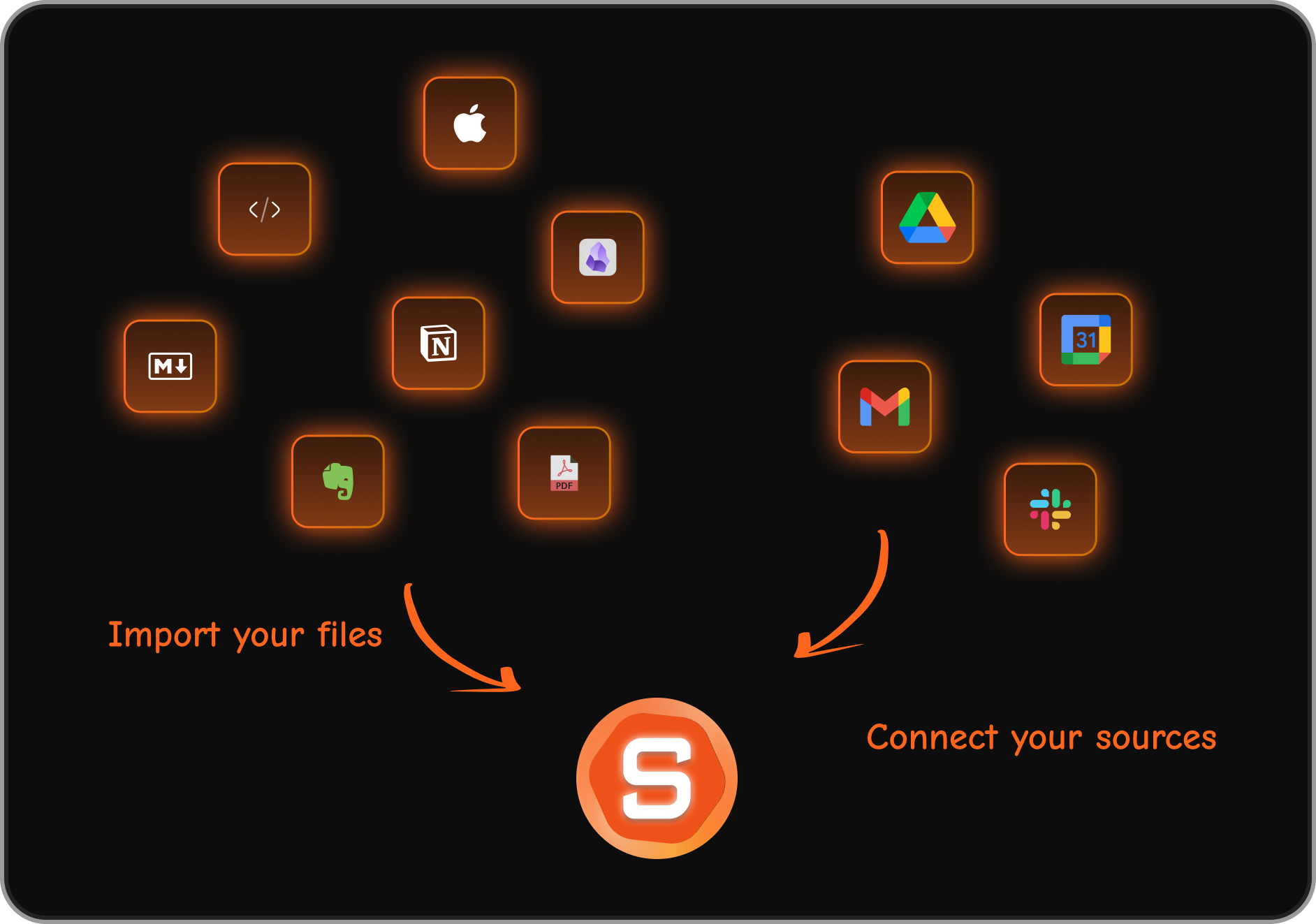
- Forest – Keeps you on track with focus sessions
- Tiimo – Visual daily planner that’s simple and non-intimidating
4. What’s the best app for executive dysfunction?
- Goblin.Tools – Breaks tasks into small, doable steps when starting feels impossible
- Saner.AI – Turns messy brain dumps into clear action items and reminders
5. Are there free neurodivergent apps?
Yes, many offer free versions:
- Saner.AI (free plan with AI reminders + calendar sync)
- Forest (basic version free, premium optional)
- Speechify (free tier with limited voices)
- Headspace and Finch (free basics, full access via subscription)
- Tiimo and Goblin.Tools (subscription-based but often with free trials)
6. Which neurodivergent apps help with motivation?
- Finch – Rewards you for completing self-care tasks with a growing digital pet
- Forest – Visual progress (trees/forest) makes staying focused more satisfying
- Saner.AI – Nudges you to follow through by reminding you of what matters
7. Which apps are best for dyslexia?
- Speechify – Reads text out loud in natural voices for easier comprehension
- Saner.AI – Lets you talk to it instead of typing, and finds notes by meaning, not spelling

8. Can neurodivergent apps replace traditional planners?
Yes - many people with ADHD or autism find digital tools easier than paper planners.
Apps like Tiimo and Saner.AI provide structure without requiring manual setup or constant maintenance.
9. Do these apps actually improve productivity?
Yes. By reducing overwhelm and supporting executive function, they help you:
- Start tasks you’d normally avoid (Goblin.Tools)
- Stay on track (Forest, Tiimo)
- Remember follow-ups (Saner.AI)
- Manage stress that drains focus (Headspace, Finch)
10. How do I choose the best neurodivergent app for me?
Ask yourself:
- Do I need help with focus (Forest, Saner.AI)?
- Do I need help with planning (Saner.AI, Goblin.Tools)?
- Do I need help with emotional regulation (Headspace, Finch)?
- Do I need help with reading or memory (Speechify, Saner.AI)?
Start with one tool that solves your biggest pain point - then layer in others if needed.
11. Which neurodivergent apps help with routines and structure?
Many neurodivergent people look for visual planners and routine builders:
- Tiimo – Excellent for visual schedules and structured daily planning
- Saner.AI – Converts brain dumps into clear tasks and reminders, reducing planning friction
- Finch – Helps you build daily habits and self-care routines with gentle motivation
12. How do I find apps that aren’t overwhelming or cluttered?
Minimal, calm, and simple apps are best. Look for:
- Limited menus and options (Goblin.Tools is a great example)
- Clean, uncluttered design (Tiimo, Saner.AI)
- No heavy setup required (Forest and Finch are quick to start)
13. Which apps are best for ADHD vs autism?
- ADHD: Saner.AI (task organization), Forest (focus sessions), Goblin.Tools (task breakdown)
- Autism: Tiimo (visual schedules), Headspace (mindfulness for sensory overwhelm), Finch (self-care motivation)
- Combined AuDHD: Many use a mix, e.g., Tiimo for structure + Saner.AI for task clarity
14. Which apps help with motivation and procrastination?
- Forest – Turns focus sessions into a gamified experience (trees grow when you stay off your phone)
- Finch – Rewards you with a growing companion for completing self-care and small wins
- Saner.AI – Nudges you to follow through on what you’ve written down. Give you a day plan every morning
15. Are there free apps for neurodivergent people?
Yes. Popular free (or free tier) options include:
- Saner.AI (basic plan free)
- Forest (free, with optional paid upgrade)
- Speechify (free tier with natural voices)
- Headspace and Finch (free basics, subscription for full access)
- Tiimo and Goblin.Tools (subscription-based, with trials or discounts)
16. What apps help with reading or dyslexia?
- Speechify – Reads text out loud in natural voices, great for dyslexia or when visual reading is tiring
- Saner.AI – Lets you talk to it instead of typing and retrieves notes based on meaning, not exact spelling
17. Which apps support emotional regulation or mental health?
- Headspace – Mindfulness and meditation reduce stress and sensory overwhelm
- Finch – Daily emotional check-ins and self-care routines
- Saner.AI – Clears mental clutter, helping reduce overwhelm from scattered thoughts
18. What makes an app hard to use for neurodivergent people?
Common complaints include:
- Overwhelming menus and too many features
- Complex setup that requires lots of executive effort
- Distracting colors, ads, or cluttered layouts
- Tools that require constant manual upkeep
19. Can I combine different apps for a full system?
Yes. For example:
- Saner.AI for organizing notes and tasks
- Forest for focus
- Speechify for reading support
- Headspace or Finch for emotional balance
This way, each app solves one problem without overwhelming you.
Stay on top of your work and life
